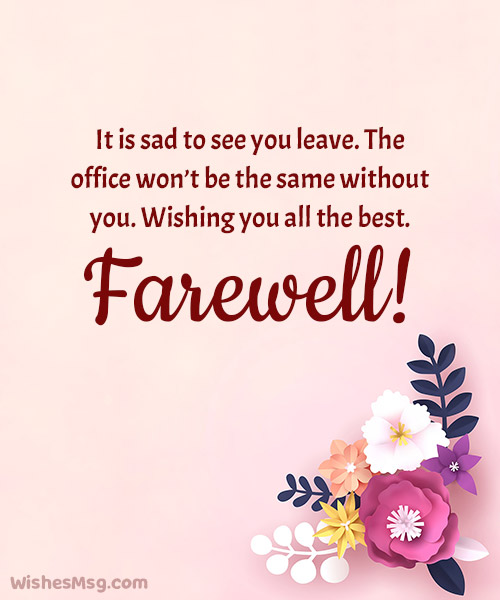
Saying goodbye to a colleague can be bittersweet. It marks the end of a shared chapter, a time of collaboration, inside jokes, and perhaps even friendship. How we express our farewells speaks volumes, not only about our feelings for the departing individual but also about our own professionalism and character. Finding the right words to convey your best wishes is a gesture that can resonate far beyond the final handshake.
Expressing heartfelt farewells to colleagues isn't a new concept. From ancient traditions of celebratory feasts to more modern practices of farewell cards and emails, the act of acknowledging a departure has long been a part of human interaction in the workplace. The core sentiment remains the same – to acknowledge the contributions of the departing individual and wish them well in their future endeavors. These expressions of goodwill can range from a simple "good luck" to a more personalized message reflecting shared experiences.
The significance of offering warm farewell wishes lies in its ability to strengthen professional relationships. A thoughtful goodbye reinforces the positive connections you've built, leaving the door open for future collaborations and networking opportunities. It also contributes to a positive work environment, fostering a sense of camaraderie and mutual respect among team members. A well-crafted farewell message conveys your appreciation for their contributions and acknowledges the impact they had on the team.
However, navigating farewells can sometimes present challenges. Striking the right tone, finding appropriate wording, and considering the individual's personality and the context of their departure all require careful consideration. A generic message may come across as insincere, while an overly emotional one could be awkward or inappropriate. The key is to find a balance that is both genuine and professional.
A simple "Best wishes" can go a long way, but adding a personal touch can make your farewell even more meaningful. Reflecting on a shared project, a funny memory, or a specific skill or trait you admire can elevate your message from a formality to a genuine expression of appreciation. For instance, you could say, "I've really enjoyed working with you on the X project. Your creativity and problem-solving skills were invaluable. I wish you all the best in your next role!" This approach shows genuine appreciation and leaves a lasting positive impression.
One challenge in crafting farewell messages is knowing how personal to be. A good rule of thumb is to gauge your relationship with the departing colleague. If you've worked closely together and have a friendly rapport, a slightly more personal message is appropriate. If your interactions have been primarily professional, a more formal tone is generally preferred.
Several websites offer helpful tips and examples of farewell messages. Some even provide templates you can customize to fit your specific situation. These resources can be invaluable in helping you find the right words to express your best wishes.
Advantages and Disadvantages of Elaborate Farewell Messages
| Advantages | Disadvantages |
|---|---|
| Strengthens professional relationships. | Can be time-consuming to craft. |
| Creates a positive impression. | Might be misinterpreted if overly personal. |
Best Practices for Farewell Messages:
1. Be timely: Send your message before the colleague's last day.
2. Keep it positive: Focus on the positive aspects of your working relationship.
3. Be sincere: Let your genuine feelings of appreciation shine through.
4. Keep it concise: Respect the colleague's time and avoid overly lengthy messages.
5. Offer to stay in touch: If you genuinely wish to maintain contact, include your contact information.
Frequently Asked Questions:
1. What should I write in a farewell card for a colleague? Express your best wishes and appreciation for their contributions.
2. How do you say goodbye to a colleague professionally? Keep your message respectful, positive, and concise.
3. What is a good farewell message? A message that conveys your appreciation and best wishes.
4. How do I say goodbye to a colleague I don't like? Keep it brief and professional, focusing on wishing them well in their future endeavors.
5. Should I give a farewell gift? This depends on your workplace culture and your relationship with the colleague.
6. Is it appropriate to send a farewell email? Yes, email is a common and accepted way to send farewell messages.
7. What if I can't attend the farewell party? Send a card or email expressing your best wishes.
8. How do I express gratitude to a departing mentor? Acknowledge their guidance and support and express your appreciation for their impact on your career.
Tips and Tricks:
Consider sending a handwritten note for a more personal touch. If you're giving a gift, choose something thoughtful and relevant to the colleague's interests.
Saying goodbye to a colleague is a natural part of the professional landscape. While it can be a time of mixed emotions, it's also an opportunity to strengthen bonds and leave a lasting positive impression. By expressing heartfelt best wishes, we not only acknowledge the contributions of our departing colleagues but also reinforce our own commitment to maintaining positive professional relationships. Taking the time to craft a thoughtful farewell message is a small gesture that can have a significant impact, leaving both you and your departing colleague with a sense of closure and goodwill as you embark on new chapters. So, the next time a colleague moves on, remember the power of a well-crafted farewell message. It’s a simple act of kindness that can make a world of difference.
Find your perfect bmw x5 in atlanta
Decoding the matrix electrical symbols and their secrets
Find your perfect pre owned toyota tacoma near you













